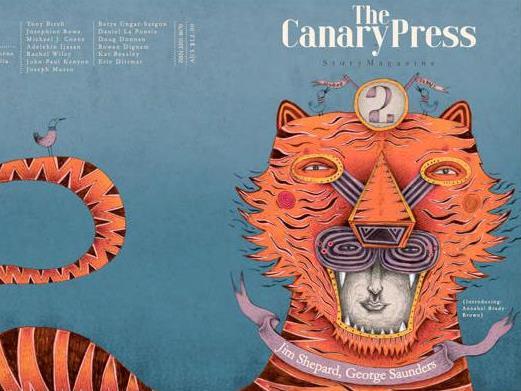The Canary Press is the Rocky Balboa of literary journals.
The journal is a rejection of the idea that ‘literature needs saving’. On issue two’s first page there’s a defiant proclamation: ‘There’s a lot of talk in Australia about how we should support literature, as thought literature is some drooling relative you’re obliged to sit with once a week. What a load of tosh.’
An explanation for the journal’s existence follows, detailing Robert Skinner founding the publication (along with the now departed Andy Josselyn). ‘I never dreamed of becoming an editor,’ he writes. ‘I just wanted to read a magazine like this one. And it had to be me, I assume, because everyone else was busy.’
As good a reason as any. But the explanation borders on justification; there’s a sense of nervous energy, as if a disappointed authority figure is moments away from slapping The Canary Press on the wrist and telling it to get a real job. The publication all the more endearing for it.
It helps that it’s a pleasure to look at, filled with colour and bold illustrations. Designer Daniel Astorquiza Castaneda and the commissioned illustrators have combined to create something that deserves its place on your desk.
The authors are a good mix of new and established. Jim Shepard and George Saunders are highlighted, with the latter contributing a small interview and one of the first stories he ever published, ‘The 400-Pound CEO’. It’s a fun read with bleak humour and quiet tragedy that overcomes the slightly jilted last few paragraphs. Shepard’s piece is a heartbreaking love story set in 1600 BC Crete. It’s also a reminder that a second-person narrative isn’t always irritating.
Local writers fill the remaining pages. Annabel Brady-Brown’s ‘Kanyeland’ gets into the head of a Kanye West obsessed 11 year-old with such authenticity it’s almost disconcerting: ‘The Kanyeland bosses say I am a very good worker and they are proud of me and that maybe if I’m lucky and mop enough throw-up then one day I’ll get to be a Beyonce too with pretty, waving, long hair and I’ll get to marry a Jay Z and hang with Obama the President and crunk all over the throne.’
Amelia Marshall weaves a story of a woman falling away from her husband in Indonesia in ‘Decoupling’ that captures the alienation of being trapped by a relationship, a hotel room and a language. Meanwhile, Caitlin Tyler details Nikola Tesla’s life and love with pigeons. The world needs more Tesla.
Many of the pieces on offer are one-pagers (8 out of 13) that keep the issue moving at a fast pace; they’re refreshing and provide some of the issues best moments. But their brevity also highlights The Canary Press’s weaknesses. When there are only a few sentences the awkward ones stand out all the more clearly and a lot of the stories could have been tighter. For example: ‘Kanyeland’ relies on its quirk a touch too much and there’s a sense that it’s not quite everything it could be; ‘Decoupled’ runs too long for too little impact (and pushes the limits of believability); and ‘Excuse Me Senator, You’re Standing On My Toes’ by Rosie Kalata shows how removing one sentence could make all the difference. Quality and potential abound but the latter makes for disappointment.
That said, it’s still a good read. Whatever concerns come up are overshadowed by the positives. There’s excitement in theses pages. From the editorials to the stories to the design, The Canary Press is eager and earnest. Its love and passion are infectious.
The Canary Press is the underdog: the magazine that needs to be here and will be here no matter what. That’s important because, ultimately, it’s right. There’s a need for more stories and short stories in particular. Like all good underdogs, The Canary Press will get better and better. Bring on issue three.
Rating: 3.5 out of 5.
The Canary Press issue 2
Edited by Richard Skinner
Paperback, 55 pages, $12
Published by The Canary Press





